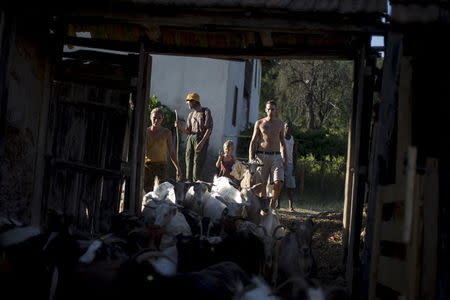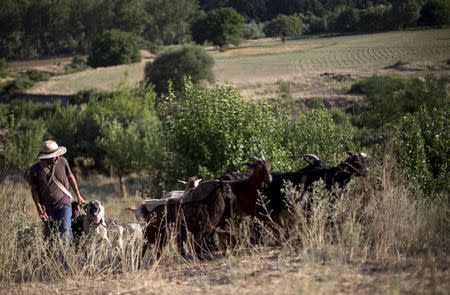Goats and herbs: Germans get back to basics in deserted Bulgarian village
By Matthias Williams and Tsvetelia Tsolova ODRINTSI, Bulgaria (Reuters) - A self-described shaman who discovered the healing powers of herbs while seeing visions on his sickbed; a former consultant for IBM who ditched PowerPoint presentations to drive across Africa and an artist from Luxembourg who is a qualified plumber. They are among a group of 22 people newly settled in the crumbling village of Odrintsi in southeastern Bulgaria where they live without electricity, but with 230 goats. They traveled in May to one of scores of villages in the Balkan country left empty as many Bulgarians migrate to richer parts of Europe. Before their arrival Odrintsi, in the Rhodope mountains near the Greek border, had a population of five. The quiet appeals to Stefan Gumbrich, the pony-tailed consultant who quit his job in 2013 and left a girlfriend behind. He is "trying to slow down my brain that was always racing", he said, while goats were milked in a nearby pen. The group originated in Germany when Juergen Hummes, a 57-year-old carpenter-turned-shaman from Moenchengladbach, gained a following for healing through spiritual counseling, meditation and administering herbs and mineral stones. Having sold their possessions and pooled their money, he and some followers settled first in a former youth hostel in the Black Forest but found life in Germany too stifling. They moved to Togo in 2007 and built a hospital, taught orphans and offered healing and natural medicines to the locals. But having given all they could to Africa, and with many of them laid low by tropical diseases, the group was ready to move on. Hummes decided on Odrintsi while meditating over a map bought via the Internet. The group has acquired half a dozen ramshackle houses in the village, where years of rain and neglect have chewed away at the clay walls. Its deserted feel is increasingly common in Bulgaria, the European Union's poorest member state, where the number of villages with a population below five people has jumped to 268 in 2014 from 184 a decade earlier. Bulgaria's population over the same period fell to 7.2 million from 7.8 million. WARM WELCOME "There is no electricity in the old houses and we plan to keep it that way," said Nadine Mukherjee, a 37-year-old former nurse. "We just want to live a life that is as close to nature as possible." Only one room is fit for habitation, to house a mother and her infant, while the rest sleep in tents. They start the day with meditation, bake bread every two days and buy vegetables from local farmers. On a hot August day, the group, some bare-chested, worked on fixing up the houses before the winter sets in. Roofs need to be fixed, double-glazing installed and muddy old wells cleaned out. There are plans for guesthouses, a proper stable for the goats, a cheese-making facility and a "house of light" for meditation. The group is learning Bulgarian and is effusive about the welcome they have received from the locals, who are clearly delighted to have new neighbors. "These people are beautiful. They do not know Bulgarian, but are very kind," said their neighbor, 57-year-old Vladimir Faitalov. Does the group miss their former life? "I really don't miss a nice house, or a hotel, or a good restaurant," Gumbrich said. "Maybe a good glass of wine from time to time, but again I think here in Bulgaria I have the chance again to try that." (Editing by Michael Roddy and Gareth Jones)






